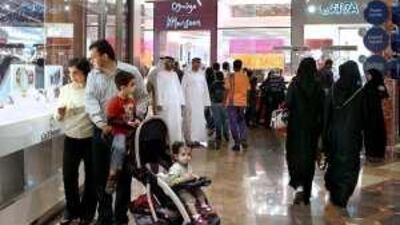ABU DHABI // Prices in the UAE of consumer goods, from cosmetics to electronics, are among the highest in the world, an investigation by The National has found. A survey of major cities reveals that shoppers in this country frequently pay significantly more than their counterparts in London, New York, Paris and Hong Kong.
The higher prices are even more striking because shopping in Abu Dhabi and Dubai is tax free - unlike in Europe, which imposes value added tax of between 15 and 25 per cent, and New York, with a sales tax of 8.5 per cent. A 107cm LG LCD television, for example, sells for Dh4,399 (US$1,198) in Abu Dhabi but can be bought for just Dh2,981 in London. The latest James Bond film on DVD costs Dh38 in London but Dh90 here.
In the survey, which also included Mumbai and Cairo, Abu Dhabi emerged as the most expensive city for Levi jeans and Nike trainers. A pair of Nike Zoom trainers was on sale for the equivalent of Dh110 in London and Dh91 in New York, but cost Dh585 in the capital. But there is some good news. The UAE is one of the cheapest countries in which to buy cars. A new Toyota Yaris is priced at Dh50,500, compared with Dh79,000 in Paris and Dh70,000 in Hong Kong.
Retail experts say there is no obvious reason why prices in the UAE should be so high compared with other cities. Laurent-Patrick Gally, vice president and lead retail analyst at Shuaa Capital, said it "makes sense" that consumer goods are often cheaper in Hong Kong, since that city is nearer the manufacturing plants in Japan and mainland China. Transport costs are much lower. But he said shipping costs could not explain why Abu Dhabi was more expensive than, for example, the United States for some electronics, since it is unlikely to cost more to transport goods here.
Instead, Mr Gally believes the reason is a lack of competition between shops. "In the US," he said, "there are more retailers and more specialised retailers and more competition." A bigger economic downturn in countries such as the US and UK may have further increased competition between retailers and led to more aggressive discounting, Mr Gally suggested. According to Robert Ziegler, a vice president of AP Kearney, a management consultancy, consumer items should be cheaper in the UAE than in many western countries.
"The import tariffs to the UAE are the same as in the other GCC countries - we're talking five per cent," Mr Ziegler said. "If you compare with a place like Germany, there's a sales tax of about 20 per cent. "You would expect prices to be about 15 per cent cheaper, but you don't see that." His explanation for the relatively high cost of electronics was one of "supply and demand". He said for certain consumer goods, especially household items that people who moved to the country would buy in large numbers, retailers "just didn't feel the need" to compete on price.
"That is the only rhyme I can find for it," he said. "I cannot see a basic reason for it from the cost side. If the situation reverses, if supply is bigger than demand, you can expect these prices to become more competitive." The price of cars was heavily influenced by the import tax, Mr Gally said, which in the case of the UAE is five per cent. In some other markets taxes can be much higher. "In Singapore the import tax is between 150 and 200 per cent," he said.
Cars here have "always been very good value", according to Mr Ziegler. "You're not paying VAT on them. You're not paying a lot of other taxes, and there's only five per cent import tax." In Egypt the data can be misleading, since shop prices tend to be heavily inflated as a result of import taxes and goods can often be much cheaper on the street. dbardsley@thenational.ae


